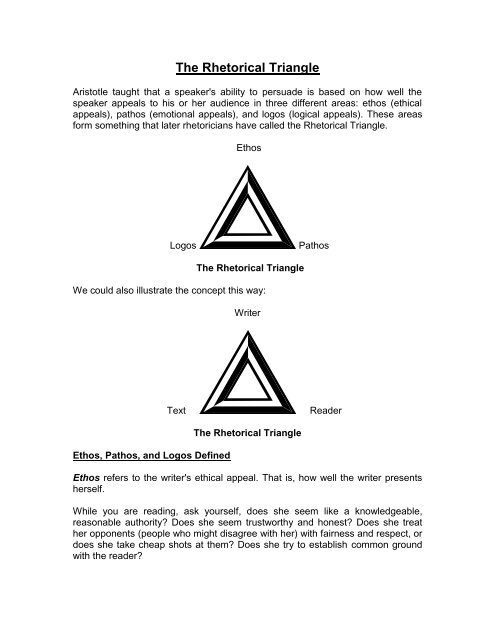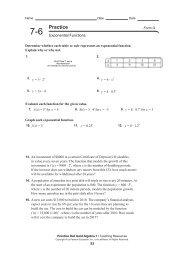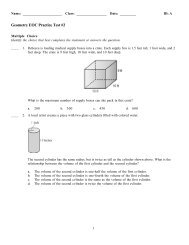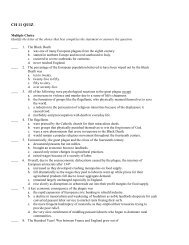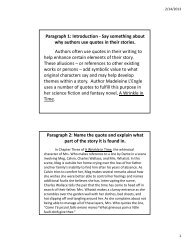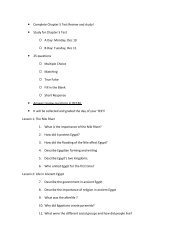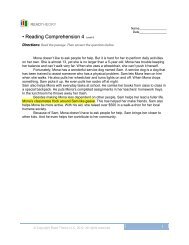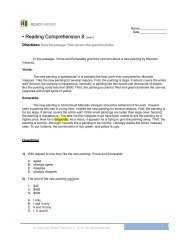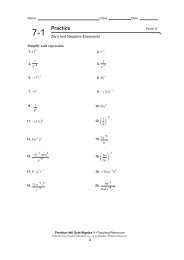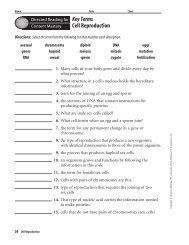5 Ethos Pathos Logos Information.pdf - Miami Arts Charter School
5 Ethos Pathos Logos Information.pdf - Miami Arts Charter School
5 Ethos Pathos Logos Information.pdf - Miami Arts Charter School
Create successful ePaper yourself
Turn your PDF publications into a flip-book with our unique Google optimized e-Paper software.
The Rhetorical TriangleAristotle taught that a speaker's ability to persuade is based on how well thespeaker appeals to his or her audience in three different areas: ethos (ethicalappeals), pathos (emotional appeals), and logos (logical appeals). These areasform something that later rhetoricians have called the Rhetorical Triangle.<strong>Ethos</strong><strong>Logos</strong><strong>Pathos</strong>The Rhetorical TriangleWe could also illustrate the concept this way:WriterTextReader<strong>Ethos</strong>, <strong>Pathos</strong>, and <strong>Logos</strong> DefinedThe Rhetorical Triangle<strong>Ethos</strong> refers to the writer's ethical appeal. That is, how well the writer presentsherself.While you are reading, ask yourself, does she seem like a knowledgeable,reasonable authority? Does she seem trustworthy and honest? Does she treather opponents (people who might disagree with her) with fairness and respect, ordoes she take cheap shots at them? Does she try to establish common groundwith the reader?
<strong>Pathos</strong> refers to the argument's emotional appeals. This appeal is how a writerwill make an argument matter to readers. Advertisements do it all the time. Awriter may offer an anecdote to illustrate suffering or appeal to readers asparents concerned for their children.When using <strong>Pathos</strong>, writers will employ the use of loaded words. This meansthat they use words with positive or negative connotations to stir people’semotions.While you are reading, ask yourself, does the writer appeal to your emotions—feelings of sadness, pride, fear, being young, anger, patriotism, love, justice? Onthe other hand, is the essay loaded with facts, figures, and nothing else? Is theemotional appeal effective or overwhelming? Does the appeal go too far?<strong>Logos</strong> corresponds with the argument's logical appeals. That is, how well thereader uses the text of his own argument and evidence. Effective arguments willprobably include facts and other supporting details to back up the author'sclaims. They may contain testimony from authorities and will demonstrate thewriter's carefulness in choosing and considering evidence. They are likely to bewell organized, skillfully written, and well edited/proofread.While you are reading, ask yourself, what is being argued here, or what is theauthor's thesis? What points does he offer to support this idea? Has hepresented arguments that seem logical, or does he seem to be jumping toconclusions? Can you think of kinds of writing that rely exclusively on logicalappeals? Do they bore you?The Equilateral TriangleNote that this triangle is essentially equilateral. Why? Again, the equal sides andangles illustrate the concept that each appeal is as important as the others. Italso suggests that a BALANCE of the three is important. Too much of one islikely to produce an argument that readers will either find unconvincing or that willcause them to stop reading.Finally, note how each of the areas potentially affects the others. An illogicalargument may move us emotionally, but only in the sense that it makes us angryat the author for wasting our time. An overwhelming emotional argument maymake us feel that the author is relying exclusively on emotions rather thanoffering solid reasoning. Finally, if an argument contains only facts and figuresand no emotional appeals, we may simply get bored. All these defects may, inturn, affect the author's ethical appeal: how can we trust a writer who appealsonly to our emotions? What common ground do we have with a writer whodoesn't appeal to our emotions at all?Adapted from materials by Dr. Joseph Sigalas


